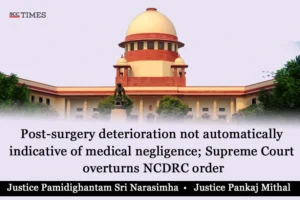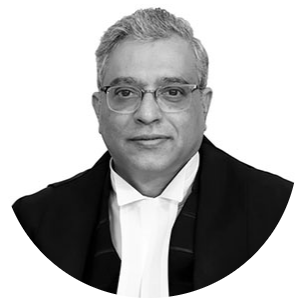Supreme Court: In appeals filed against the judgment passed by National Consumer Disputes Redressal Commission (‘NCDRC’), wherein it was held that the doctor was apparently negligent in not giving proper treatment and was also careless in not performing the repeat eye surgery, the division bench of Pamidighantam Sri Narasimha and Pankaj Mithal, JJ. while setting aside the impugned judgment, held that simply for the reason that the patient has not responded favourably to the surgery or the treatment administered by a doctor or that the surgery has failed, the doctor cannot be held liable for medical negligence straightway by applying the doctrine of Res Ipsa Loquitor unless it is established by evidence that the doctor failed to exercise the due skill possessed by him in discharging of his duties.
Background:
The complainants are the father and son. The son was a minor aged about 6 years when he was diagnosed with a congenital disorder in his left eye (also known as ‘PTOSIS’ or ‘drooping eyelid’) for which a minor surgery was performed on 26-06-1996 by the Doctor at the Post Graduate Institute of Medical Education & Research, Chandigarh (‘PGI’). The complainant alleges that there was no other defect in the eyes of the son and both eyes had normal vision and the physical deformity diagnosed could have been cured by a minor operation which required lifting of the left eyelid a little to make it of the same size as the right eye but the said surgery was done in a most negligent manner. Instead of any improvement the condition of the eye further deteriorated post-surgery.
The complainants through the complaint made to the State Commission, claimed compensation of Rs.15,00,000/- for the sufferings due to negligence of the doctor and a further sum of Rs.4,55,000/- towards the cost of the treatment, loss of studies etc.
The complaint case regarding medical negligence against a Doctor and PGI was dismissed by the State Commission vide judgment and order dated 27-05-2005. The Commission concluded that the complainants failed to establish any negligence or carelessness on part of the doctor in treating one of the complainants and that the doctor had not adopted any unacceptable medical practice which may have caused damage to the patient.
Aggrieved by the above decision, the complainants preferred to appeal before the NCDRC. After remand in the first round, the matter again came up before the NCDRC wherein the impugned order has been passed and the complaint has been partly allowed. The judgment and order of the State Commission dismissing the complaint has been set aside holding that the Doctor and the PGI are jointly and severely liable for payment of compensation of Rs.3,00,000/- and Rs.50,000/- as costs with 6% interest from the date of the complaint for the negligence in treatment.
The Doctor and the PGI together have filed a civil appeal aggrieved by the finding of NCDRC.
Analysis and Decision:
The Court said that deterioration of the condition of the patient post-surgery is not necessarily indicative or suggestive of the fact that the surgery performed, or the treatment given to the patient was not proper or inappropriate or that there was some negligence in administering the same. In the case of surgery or such treatment it is not necessary that in every case the condition of the patient improve, and the surgery is successful to the satisfaction of the patient. It is very much possible that in some rare cases complications of such a nature arise but that by itself does not establish any actionable negligence on the part of the medical expert.
The Court highlighted that the NCDRC itself acknowledged that Dr. Neeraj Sud had the necessary professional qualification and expertise to treat the patient, but it has granted compensation only because he did not bring the requisite skill and care in the treatment of the patient.
The Bench remarked that the said finding is based on no evidence insofar as the complainants have not provided any evidence to prove any negligence on the part of the doctor but rather have relied upon the medical records produced by PGI. The said records merely demonstrate that post-surgery the condition of the patient had not improved but has deteriorated, which as stated earlier may not be indicative of negligence in the treatment of the patient.
The Court reiterated that actionable negligence in context of medical profession involves three constituents (i) duty to exercise due care; (ii) breach of duty and (iii) consequential damage.
Further, the Court stated that a simple lack of care, an error of judgment or an accident is not sufficient proof of negligence on the part of the medical professional so long as the doctor follows the acceptable practice of the medical profession in discharge of his duties. He cannot be held liable for negligence merely because a better alternative treatment or course of treatment was available or that more skilled doctors were there who could have administered better treatment.
The Court underscored that a medical professional may be held liable for negligence only when he is not possessed with the requisite qualification or skill or when he fails to exercise reasonable skill which he possesses in giving the treatment.
The Bench noted that none of the above two essential conditions for establishing negligence stand satisfied in the case at hand as no evidence was brought on record to prove that the said Doctor had not exercised due diligence, care or skill which he possessed in operating the patient and giving treatment to him.
After applying the famous Bolam’s test1 , the Court said that the Doctor was a competent and a skilled doctor possessing requisite qualification to perform PTOSIS surgery and to administer the requisite treatment and that he had followed the accepted mode of practice in performing the surgery and that there was no material to establish any overt act or omission to prove negligence on his part.
The Court opined that NCDRC ought not to have interfered with the findings and the impugned judgment and order of the State Commission to hold the doctor of the PGI negligent and to award compensation. Thus, the Court set aside the impugned judgment and order.
CASE DETAILS
| Citation: 2024 SCC OnLine SC 3069 Appellants : Respondents : |
Advocates who appeared in this case For Petitioner(s): For Respondent(s): |
CORAM :
1. Bolam v. Friern Hospital Management Committee (Queen’s Bench Division) , English Law (1957) 1 WLR 582


